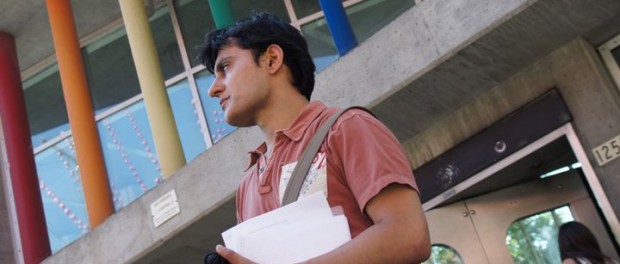Through my Brown Gay Lens in Tokyo
Travelling the world and exploring different cultures is more fun for me when I see through my Brown Gay lens, looking to explore how queer people are treated in different parts of the globe. Some stereotypes are on point, while others completely misplaced and what better way to challenge them than by taking to the streets of a new city and exploring what lurks behind the scenes.
My recent visit to Tokyo gave me one such opportunity. At the outset, I have to acknowledge that Tokyo is, thus far, my favorite favorite destination. The city is amazing in all respects: a perfect blend of modernity and culture, rich tradition of ancient worship (not of gods or idols, but real people) and just the inherent cultured sensibility of the Japanese people. I was honestly floored. I decided to rent a room in Shinjuku, a central neighbourhood of the city, which most forums opined was walking distance to all the queer hangouts. Mind you, there is no real ‘Gay Village’ in Tokyo. I think even in North America the idea of the Gay Village has evolved considerably, but for a city like Tokyo, there are just sporadic hang out places, bars, restos that cater to the community. I had done some research on what queer life was like in Tokyo, and the experience turned out to be pretty intriguing.
My days started with visits to the various Shrines around the city. The serenity of honoring ones ancestors as a source of strength was a surprisingly spiritual. Once done with the touristy chores of the day, I found that most (queer friendly) bars that I visited turned out to be ‘Japanese only’ and while non-Japanese people are not excluded from them, I didn’t sense a warm welcome at a few places, thus turning away at the door was a pretty good idea. The one bar that I did manage to squeeze into had a rather homogenous feel to it. I was very intrigued at the socio-economic and age distinction among the crowd. Perhaps the place was meant for a certain ‘clientele’, but essentially it seemed like only wealthy men frequented that establishment. Then there was this visible separation between the desired and the desirous. It never fails to surprise me that within gay culture masculinity continues to hold such a huge sway. I always hope that at least same gender interaction shouldn’t have a hierarchy, nor be conformist. But I always find that even two men prefer to take gender roles (risky generalization, I know). Sometimes it’s blatant, other times it’s this unsaid, subtle acceptance of roles. Visible queer life in Tokyo/Japan was no exception to this rule.
The conservative side of Japanese society played out perfectly in the queer settings. I observed little overt sexualization, and while the taboo of being queer seemed to be on an evolutionary trajectory, at the heart of Japanese society, this is a still one where family, tradition and norms hold complete influence. The genre of men I encountered fit the dominant, all masculine stereotype, and their objects of affection were the ones unlike them.
The dichotomy of this city struck me greatly. I attribute my observations to my conditioning, where modernity and technological advancement seem contradictory to tradition and cultural observance. Most other cultural examples can’t boast of a similar feat. It’s like tradition and culture must be sacrificed in the name of modernity and development. Nope, not here.
I did finally end up at a ‘foreigner friendly’ spot that was more diverse and had white people. The irony that seeing more white people in the crowd made me feel at home. “Even race interactions can be so contextual,” I reflected over a sarcastic laugh. This joint was more reflective of what we find in North America and the crowd was just a bunch of us queers hanging out, dancing and drinking and being gay in our common experience.
I am not sure what matters more, the pleasures of cultural and infrastructural modernity or the liberty to be who you are and do what you want. I am deeply split about this. But for the brief time I spent in Japan, I have to say I fell in love with conformity and the comfort it brings.
Have something to share with Karan? Leave a comment below.






